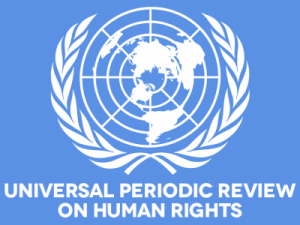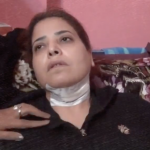 Human Rights Council – Forty-third session
Human Rights Council – Forty-third session
24 February–20 March 2020
Agenda item 6
Universal Periodic Review
Joint written statement* submitted by Jubilee Campaign, non-governmental organizations in special consultative status. The Secretary-General has received the following written statement which is circulated in accordance with Economic and Social Council resolution 1996/31.
03 February 2020
Following-up the Universal Periodic Review of the Arab Republic of Egypt
Jubilee Campaign together with Coptic Solidarity, seeks to draw the Council’s attention to the domestic human rights and religious freedom situation in the Arab Republic of Egypt and follow-up on the recommendations to be examined by Egypt.
I. Refugees
While Egypt has a large population of over 100 million it has been able to host around 250 000 registered refugees and asylum seekers from different countries according to the UN Refugee Agency (UNHCR). Egypt mentions in their report that the five million refugees and immigrants who have not sought asylum, “enjoy the same basic services as Egyptians free of charge.” This statement is not true. Not all refugees are entitled to public education. Ethiopian, Eritrean, Somali and Iraqi nationals for example are not entitled to enrol. Moreover, Syrian and Sudanese students have reported discrimination and harassment in Egyptian schools from their peers but also on occasion from their teachers. Many Syrian students are enrolled in the Egyptian schools but in reality attend community based schools due to discrimination, racism and sexual and gender-based violence against women.
According to the Ministry of Interior’s Decree No. 8180 of 1996, refugees should receive a three-year temporary residency permit, this Decree is not implemented in practice but is overruled by a Ministry of Interior’s Department of Migration and Citizenship decision granting a refugee who has passed the Refugee Status Determination interview (RSD) only a six-month renewable residency permit. In addition, since October 2019 the cost of the residency permit has more than doubled from 40 EGP to 100 EGP while the economic situation for refugees remains the same, if not worse with the rise of rent. This increase in price of the residency permit places an unfair burden on refugees and goes against article 25 of the Refugee Convention. Refugees in Egypt are not allowed to work legally in the country which adds to their economic exploitation. The residency permit is essential for refugees to gain access to many of the service providers. Thus, the increase of the residence visa permit cost and its limited validity period places refugees in Egypt under risk of detention for expired residency permits and leaves them financially vulnerable.
Local humanitarian organisations in Egypt have criticised the lack of medical assistance to refugees in the early stages of illness. Oftentimes a refugee does not qualify for medical aid until their illness is life-threatening. The humanitarian organisations recognised that early intervention and health assistance for a refugee can help refugees keep their work and support their families, as opposed to waiting for an illness to be exacerbated resulting in a greater financial burden for the family and service provider.
Recommendations
For the fulfilment of recommendations 31.365 by Japan and 31.368 by Afghanistan Jubilee Campaign urges the Arab Republic of Egypt to take these additional steps:
- Entitle Ethiopian, Eritrean, Somali and Iraqi refugees the right to enrol in public education.
- Lower the cost of the residency permit in accordance with Article 25 of the Refugee Convention or alternatively extend the visa validation to last one year. Without a residence visa, refugees cannot access education or service providers for medical assistance, the recognition of their birth certificate and other needs.
- Fully implement the Refugee Convention without reservations.
Jubilee Campaign urges the Human Rights Council to:
- Urge the UNHCR to recognise converts from Islam (both atheists and Christians) as a particularly vulnerable group and provide for expedited resettlement similar to the LGBTI framework introduced, given that conversion is effectively illegal in Egypt and nearly all neighbouring countries criminalise conversion. Ensure also that training is provided for officers reviewing a converts claim to ensure due process.
- Increase funds to the UNHCR in Egypt and other humanitarian organisations working in Egypt.
- Increase resettlement spots for refugees until Egypt becomes a durable solution for refugees.
- Encourage changes to the requirements for medical assistance from service United Nations funded service providers to ensure early effective action and sustainable solutions.
II. Freedom of Religion or Belief
Houses of Worship
While Jubilee Campaign welcomes the steps the government of Egypt has taken with the 2016 law on the building and renovation of churches which has allowed for the construction of some churches who have waited decades for a permit, Jubilee Campaign still remains concerned at the selective application of the law, the delay in processing applications and continued discrimination of religious minorities right to worship.
The Cabinet has issued 13 decrees, based on the opinion of the church regularization committee, since the committee began its work. These decrees granted preliminary legal status to 1,412 churches and associated buildings. The remaining 75% are still waiting for their applications to be processed. According to the Egyptian Initiative for Personal Rights (EIFR) it will take nine more years for all applicants to receive conditional legal status if the rate for processing application remains at this pace.
State institutions have granted approvals to build churches in new cities after the allocation of land by the Ministry of Housing. Meanwhile however, the Egyptian Initiative for Personal Rights has documented 32 instances of violence from members of the Muslim population towards Christians since the introduction of the law in 2016 until 2019. The violence has resulted in the closure of churches, pressure on informal churches as they tried to register themselves, blocking of planned construction of new churches. Of the 32 violent incidents, 26 resulted in the closure of churches, in which prayers were being held, with only four being reopened again. Only two of the 32 churches were able to resume services as usual. These incidents which have limited the right to worship across nine governorates, concentrated in Minya, Beni Suef, and Sohag. Security establishments have shut down churches that are regularly used for worship on the grounds that they lack official permits in violation of Article 8 of the Law 80/2016 on the construction of churches.
Concerns regarding Collective Punishment & Reconciliation Sessions
While Egypt cites the “Egyptian Family House” initiative as one of the ways to “combat religious-based violence” the use of similar community sessions to settle violence by Muslim mobs when they attack Copts and Christians and their properties undermines the importance of police reports, legal charges, and justice for Coptic victims. Local police typically arrest both Copts and Muslims, despite culpability, during incidents when Muslim mobs attack Copts, their homes, and churches. The arrested Copts are used as bargaining chips to assure Coptic cooperation.
Concerns regarding the Police arrest of Ramy Kamel
As of February 2020, Police continue to hold Ramy Kamel in detention. Egyptian authorities arrested the Coptic blogger and human rights activist under false charges in November 2019. Jubilee Campaign and Coptic Solidarity are extremely concerned about his safety since reports that security forces have both beaten and tortured him. Mr. Ramy Kamel had a wide range of activism in promoting Coptic rights and citizenship.
Discrimination of religious minorities
Tax money in Egypt currently supports al-Azhar University which does not permit non-Muslim students and has budget that is five times higher than Cairo University which welcomes students of all faiths.
Any individual may convert to Islam and have faith on their ID changed. If an individual converts away from Islam, however the Ministry of Interior will not change the faith on their ID card. In this way, converts and their children will continue to be listed as Muslims, subjected to shari’a, and forced to study Islam in public school despite not being Muslim.
Recommendations
Jubilee Campaign in pursuant with recommendation 31.161 by Haiti urges the Arabic Republic of Egypt to:
- Remove the administrative obstacles to changing religion on ID cards for those born Muslim.
- Issue a single decree to grant final legal status to all churches and subsidiary buildings that applied for status with the church regularization committee.
- Pass a uniform law on houses of worship that would recognize all Egyptians’ right to freely worship.
- Introduce an investigation into the cause of the recent church fires in November 2019.
- Release unequivocally Ramy Kamel and other prisoners of conscience arrested for their peaceful expression of speech.
- Eliminate the ability for the Research Center of al-Azhar to censor and confiscate any public publications, speeches, recordings, or art deemed inconsistent with that institution’s views on Islam and their interpretation if Islamic law.
III. Women and Children
Jubilee Campaign commends the government of Egypt for granting a Coptic woman equal inheritance rights in November 2019. The Coptic woman won a landmark ruling granting her equal inheritance by the seventh circuit of the Helwan family court. This is a step in the right direction to ensure the full equality of women.
Recommendations
Jubilee Campaign urges Egypt to:
- Address and take affirmative actions to curb the cases of kidnappings and attacks of minority women.
Coptic Solidarity NGO(s) without consultative status, also share the views expressed in this statement.
* Issued as received, in the language(s) of submission only.
____________________
Photo Credit: Egypt Today





